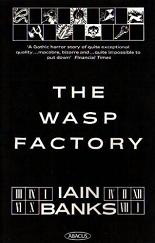
The Wasp Factory
Iain Banks
184 pages
published in 1984
Before you can start to read The Wasp Factory, you have to wade through the obligatory few pages of quotes praising the book. Tempted as you may be to skip this, do not do so, as it's slightly different from what you may expect, as you can see:
It is a sick, sick world when the confidence and investment of an astute firm of publishers is justified by a work of unparalleled depravity.
There is no denying the bizarre fertility of the author's imagination: his brilliant dialogue, his cruel humour, his repellent inventiveness. The majority of the literate public, however, will be relieved that only reviewers are obliged to look at any of it. Irish Times
That is only the most extreme of the negative reviews that Banks insisted be included in the quotes for the paperback version of The Wasp Factory, which run to about half of the quoted reviews altogether. It's not every author that has the confidence to do so, especially not for their first novel, but then again these negative reviews do help sell the book as much as the positive ones do. they make you wonder just what it is about The Wasp Factory that these reviewers object to so much?
It helps to remember the context in which The Wasp Factory was published, back in 1984. The UK was ruled by a deeply conservative government, which was big on "traditional family values, combined with a reactionary popular press in the grip of succesive moral panics. One of which was the panic about "video nasties", the fact that the advent of the video cassette and rental shop now meant the plebs could see all those nasty, disgusting horror movies at home, things like "Driller Killer" and "I Spit on Your Grave", which may indeed have had little social redemption, though have not led to a generation of zombie killers, oddly enough. In that climate, a book that looked like the literary equivalent of a video nasty, starring a psychopath who lovingly describes how he murdered three people and got away with and spent his days thinking of ways of torturing animals and then doing so, who never gets punished for all of this and in fact, the author seems to be on his side, is bound to be received a bit coolly.
But to look at The Wasp Factory as just an exercise in amorality, an excuse to showcase horror scenes is to miss the power of the book. Banks does not make the horror scenes appealing or glamourous at all, but writes about them matter of factly, through the eyes of his protagonist, for whom these are not horror scenes, but a method of survival in an uncertain world. The obsessiveness with which he pursues his rituals, not just the obvious horrorshows, but also the more benign activities he undertakes may be unpleasant to read about at times, but I never got the feeling Banks reveled in this, as the Irish Times reviewer seems to insinuate.
The plot, such as it is, revolves around the protagonist Frank's fears about his mad brother Eric, who has escaped from his mental institution. Eric has the unfortunate habit of setting dogs on fire, amongst other things and Frank worries because he knows Eric is coming back to the island where Frank and his father live. Frank has several defense mechanisms and semi-religious rituals set up to protect himself from his enemies, which are visited in the course of the book. Early on, Frank mentions offhand that he has killed three people and he tells about how he manage to do this without being caught in great detail.
But while the rituals and killings and such are described in great detail and gusto, Frank's reasons for them are kept vague. It's obvious he is a psychopath and perfectly happy to kill for his advantage, but for most of his actions there seem to be no clear advantage he can get from them, apart from psychological. Some sort of massive trauma seems to lie at the heart of his behaviour, some hidden mystery wrapped in layers of secrets and only half understood motivations, a mystery he himself may not even be aware of.
Now to be honest, Banks does not entirely succeed in keeping this central mystery hidden until his big reveal; I guessed it about halfway through the book, after a few too many hints were dropped. The Wasp Factory then is not such a big succes in this regard as some of his later novels would be. The interesting thing is that all those elements that made Banks reputation, setpiece horror scenes, a deliberately complex narrative structure, hidden secrets only revealed late in the story and somewhat amoral main characters, were already present in his first published novel.
Not that this means that The Wasp Factory is only interesting in the context of Banks' later works: it is a powerful piece of writing in its own regard. Some of the impact of the book may have been lost with the passing of time: it is twentytwo years since first publication after all.
Other Iain (M.) Banks reviews: Look to Windward, The Algebraist, A Song of Stone, Espedair Street, Excession.
Read more about:
Iain Banks,
The Wasp Factory,
book review